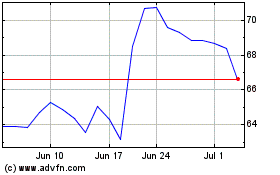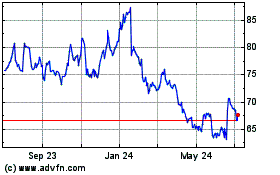Gilead Sciences Inc.'s (GILD) fourth-quarter profit fell 22% as
costs rose and year-ago results benefited from flu-related
stockpiling. The Foster City, Calif., drug maker also reported a
setback in getting its latest HIV treatment to the market.
Gilead said the Food and Drug Administration didn't accept its
market application for its single-pill combo of Truvada and TMC278.
The news is notable because Wall Street is concerned about the
company's pipeline development as several drugs face patent
expirations later this decade.
TMC278, or rilpivirine, is an antiviral drug in development by
Johnson & Johnson (JNJ). The two companies have a collaboration
agreement to develop the combination pill, which is commonly called
"B-tripla" on Wall Street, because it is the followup to Gilead's
top-selling Atripla pill.
Gilead said the FDA wants more information related to Chemistry,
Manufacturing and Controls section of the submission that relates
to the Truvada portion of the drug. The company expects to resubmit
by the end of March.
Shares of Gilead, which recently fell 2% to $37.40 in
after-hours trading, are down 17% over the past 12 months and are
well off their mid-2008 highs above $57.
Wachovia analyst Brian Abrahams said the news wasn't a major
setback, but should delay the drug from getting to the market by
four months with an FDA decision by the end of September. On
average, analysts expect the drug to have sales of $60 million for
2011.
On a conference call Tuesday, Chief Scientific Officer Norbert
Bischofberger called the setback a "minor delay" that won't impact
ongoing studies of the drug against other treatments, and testing
the drug in patients that are switching from other therapies.
Bischofberger believes the company will still be able to
introduce the drug in the second half of the 2011. Chief Executive
and Chairman John Martin also expressed confidence in development
of the drug and the rest of its pipeline in the call.
"Ultimately our success over the long term is dependent upon
innovation and pipeline advancement," Martin said.
Earlier Tuesday, Barclays Capital analyst Jim Birchenough said
Gilead's growth in the HIV segment remains dependent on greater
expansion of earlier treatment of the disease, something that
remains uncertain.
"Given fixed asset life of HIV products and potential generic
risks in 2017 and 2020, we expect GILD shares to remain range-bound
pending better visibility on pipeline progress," Birchenough wrote
in a note to clients.
On the conference call, Martin expressed confidence that the
company is making progress on this front and is gaining sales
momentum from guidelines in the U.S. and overseas that support
earlier diagnosis and treatment of HIV.
In Europe, Gilead projects price cuts of 3% to 4% in 2011 when
compared to 2010. The reductions are a result of both budget
trimming measures and regular price pressures in the region.
Looking forward, Gilead expects net product sales for 2011 of
$7.9 billion to $8.1 billion. Wall Street currently projects total
revenue for the year of $8.43 billion, which includes revenue from
royalties, contracts and other sources. In 2010, the company
reported product sales of $7.39 billion and revenue of $7.95
billion.
In 2010, Gilead repeatedly cut its full-year projections, citing
foreign currency fluctuations and health reform, forcing Wall
Street to also lower its estimates.
On Tuesday, Gilead also reiterated that the health-care overhaul
would cut its 2011 U.S. product sales by 5% to 6%, a similar amount
as the current year, plus an excise tax of $30 million to $50
million. The company said the overhaul hit U.S. net revenue by $200
million in 2010, as expected.
For the three months ended Dec. 30, Gilead reported net income
of $629.4 million, or 76 cents a share, down from $802.2 million,
or 87 cents a share, a year earlier. Excluding items, per-share
earnings were 95 cents a share, equal with analysts' expectations,
according to a survey from Thomson Reuters.
Revenue climbed dropped 1.7% to $2 billion, slight ahead of a
Wall Street projection of $1.99 billion.
The results in the latest quarter were hurt by higher research
and development costs along with acquisition and restructuring
expenses, while the year-ago quarter benefited from increased sales
of flu treatment Tamiflu, from which it gets royalties from Roche
Holding AG (RHHBY, ROG.VX).
The company's per-share earnings were boosted by an ongoing
massive stock repurchase plan. In the quarter, Gilead bought $615.4
million in stock. For the year, it bought 109.9 million shares for
$4.02 billion, cutting its total shares outstanding by 12%.
Gilead said its board also authorized an additional three-year,
$5 billion stock repurchase program. The company had about $5.3
billion in cash, cash equivalents and marketable securities at the
end of December.
Chief Financial Officer Robin Washington said that the company
expects to complete the remaining $2 billion in its current
repurchase program in 2011.
Third-quarter sales of Truvada, which includes two Gilead drugs,
rose 1.7%, to $681.7 million, above a Wall Street consensus
estimate of $677 million, according to research firm ISI Group.
The company's biggest seller, Atripla, a triple treatment of
Truvada with Bristol-Myers Squibb Co.'s (BMY) Sustiva, had sales
rise 11%, to $775.2 million, above a Wall Street view of $765
million.
Gilead said growth in both Atripla and Truvada was driven by
increased sales volume in the U.S. and Europe.
Royalty, contract and other revenue in the quarter dropped to
$68.4 million in the quarter from $228 million a year ago, primary
from lower Tamiflu royalties.
-By Thomas Gryta, Dow Jones Newswires; 212-416-2169;
thomas.gryta@dowjones.com
Gilead Sciences (NASDAQ:GILD)
Historical Stock Chart
From Jun 2024 to Jul 2024

Gilead Sciences (NASDAQ:GILD)
Historical Stock Chart
From Jul 2023 to Jul 2024
